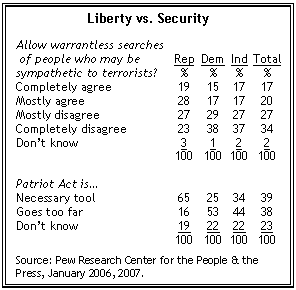by Richard C. Auxier and Alec Tyson
Eight Republican candidates for president met at the University of New Hampshire Wednesday night for a debate broadcast nationally on the Fox News Channel. Former Tennessee Sen. Fred Thompson, who entered the 2008 campaign later that night during an appearance on the “Tonight Show With Jay Leno,” did not take part in the debate. What follows is an analysis of how candidate views expressed during the debate compare with public opinion on topics that were discussed.
Iraq

With all but one of the candidates — Rep. Ron Paul of Texas — supporting an American military presence in Iraq, the debate focused on how committed the candidates were to the war effort and the continued deployment of U.S. troops. That debate began with a sharp question from Fox News moderator Wendell Goler to former Massachusetts Governor Mitt Romney on his proposal to begin withdrawing troops in the spring: “Correct me if I’m wrong, but it seems even Hillary Clinton is willing to commit troops to Iraq longer than that, sir.” Romney asserted that he had not announced a “time frame,” but he continued, “If the surge is working, then we’re going to be able to start bringing back our troop levels, slowly but surely, and play more of a support role over time.”
“Governor, the surge is working . . . no, not apparently — it’s working,” retorted Sen. John McCain of Arizona. Most Republicans share McCain’s assessment of the war. In a July Pew survey, 61% of Republicans said the U.S. military effort is going very or fairly well and 70% said the U.S. will definitely or probably succeed in achieving its goals in Iraq. The general public, however, has a much more negative outlook on the war. Only 36% believe that the military effort is going well, and a 49% plurality say that the U.S. will probably or definitely fail in achieving its goals.

McCain then proceeded to comment on Romney’s statement on bringing down troop levels. “The great debate is going to take place on the floor of the United States Senate, the middle of this month,” said McCain. “And it’s going to be whether we set a date for withdrawal, which will be a date for surrender, or whether we will let this surge continue and succeed.”
In the July Pew survey, Republicans favored keeping troops in Iraq until the situation has stabilized by a wide margin of 74% to 18%. Only 11% expressed support for a plan to gradually withdraw troops over the next year or two. Once again though, the general public is in disagreement with McCain and Republicans. They support bringing the troops home by a margin of 54% to 39%.
Paul, who championed himself as the “anti-war candidate representing the Republican traditional position,” continued to stress his position that troops should be brought home immediately (a position he shares with just 7% of Republicans). “We need a new foreign policy that said we ought to mind our own business,” said Paul. Former Governor Mike Huckabee of Arkansas disagreed, engaging Paul in one of the more dramatic moments of the night. “Well, what we did in Iraq, we essentially broke it,” said Huckabee. “It’s our responsibility to do the best we can to try to fix it before we just turn away because something is at stake.”
While the audience in New Hampshire seemed split, as evidenced by competitive rounds of applause as the respective candidates made their arguments, Republicans across the country clearly side with Huckabee. In a December 2006 Pew survey, 66% of Republicans disagreed with the statement “the U.S. should mind its own business internationally,” while only 30% agreed. The general public also disagreed with the statement, but by a narrower margin of 53% to 42%.
Liberty and Security

Paul went on to connect the issues of liberty and security by saying: “This whole idea that we’re supposed to sacrifice liberty for security — we were advised against that. Don’t we remember that when you sacrifice liberty for security, you lose both? That’s what’s happening in this country today.” The Republican Party holds ambivalent views on questions that pit liberty against security. Just under half (47%) of Republicans agree that, even without a court order, police should be allowed to search the houses of people who might be sympathetic to terrorists; but slightly more – 50% — do not agree. However, when asked in January 2006 about the Patriot Act, 65% of Republicans called the act a necessary tool that helps the government find terrorists, while only 16% said the act went too far and posed a threat to civil liberties.
Values
Family values received particular attention during the debate in light of the recent arrest of Idaho Sen. Larry Craig in a public bathroom sex sting. Sen. Sam Brownback of Kansas stated “it is important that the party stand for family values…the lead thing we need to do is rebuild the family in this country.” Brownback’s comments were likely well received by the 86% of Republicans who say they hold old-fashioned values about family and marriage. Majorities of Democrats (70%) and Independents (75%) also say they have old-fashioned values on family and marriage.
On the issue of abortion, Romney laid out a position that emphasized the role of states in establishing abortion laws. Huckabee took a different approach, expressing his support nationally for a human life amendment that was passed in his state of Arkansas. A 54% majority of Republicans favor making it more difficult for a woman to get an abortion, while 40% oppose such measures. Democrats (24%) and Independents (33%) are much less likely to support making it more difficult for a woman to get an abortion.
Brownback expressed his strong opposition to gay marriage and said there should be a constitutional amendment banning gay marriage because marriage “is a foundational institution.” He went on to suggest that redefining marriage would lead to more children born out of wedlock. Brownback is on firm ground within his party, as a 75% majority of Republicans oppose allowing gays and lesbians to marry legally, and 51% are strongly opposed. Democrats take a more mixed view, with 49% in favor of allowing gays and lesbians to marry legally, and 43% opposed.
Immigration
[S]
[Border Patrol agents]

Both former New York Mayor Rudy Giuliani and McCain were asked how their separate proposals on immigration could not be considered “amnesty.” Giuliani cited a need for border security and identification cards, while McCain said the proposal he supported in Congress — which was opposed by Republicans by a margin of 36% to 43% in a June Pew survey — was not amnesty because it was not “forgiveness” and it imposed numerous requirements and conditions on those seeking citizenship. While Republicans favor — by a margin of 62% to 33% — providing a way for illegal immigrants to gain legal citizenship if they pass a background check, pay fines, they are evenly divided about “providing amnesty” to those who meet the same standards, with 47% in support and to 48% opposed. Thus, when McCain stated that “No one, by the way, is for amnesty,” he may have been offering his interpretation of the platforms of the GOP candidates, but he was not accurately describing the attitudes of the GOP rank and file.
Gun Control
On gun control, Goler asked if the Virginia Tech tragedy may have been reduced in scale if students had been allowed to carry guns. Giuliani replied that “the FBI would disagree with that” and went on to say the states should decide if college students should be allowed to carry weapons. Republicans (8%) are less than half as likely as Democrats (22%) to say that the Virginia Tech shootings reflect a broader problem with gun laws and the ease of getting guns. Not surprisingly, Republicans are more pro-gun than the general public on a number of gun control measures: half (50%) of Republicans say it is more important to protect the right of Americans to own guns than it is to control gun ownership, compared with 32% of the general public. Three-in-four (75%) Republicans oppose a law to ban the sale of handguns. The public also opposes a ban on the sale of handguns (55%), but in lesser numbers.
Paul took a unique stance on gun control in light of the 9/11 attacks. He said it is the responsibility of the commercial airlines to protect aircrafts and passengers, adding that “if we wouldn’t have been dependent on the federal government to set all the rules, which meant no guns and no resistance, then the terrorists may well have had second thoughts.” That statement may appeal to pro-gun Republicans, and it may also appeal to the 61% of Republicans who say that when something is run by the government it is usually wasteful and inefficient.
